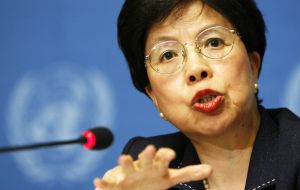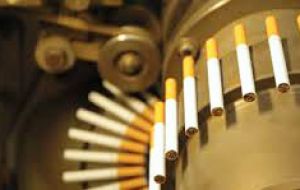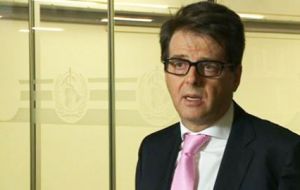MercoPress. South Atlantic News Agency
WHO calls for action against illicit tobacco trade on World No Tobacco Day
 “The Protocol offers the world a unique legal instrument to counter and eventually eliminate a sophisticated criminal activity,” says Dr Margaret Chan
“The Protocol offers the world a unique legal instrument to counter and eventually eliminate a sophisticated criminal activity,” says Dr Margaret Chan  “Manufacturers know that once implemented, it will become much harder to hook young people and the poor into tobacco addiction”
“Manufacturers know that once implemented, it will become much harder to hook young people and the poor into tobacco addiction”  “Public health is engaged in a pitched battle against a ruthless industry,” says WHO Department director Dr Douglas Bettcher
“Public health is engaged in a pitched battle against a ruthless industry,” says WHO Department director Dr Douglas Bettcher Eliminating the illicit trade in tobacco would generate an annual tax windfall of 31 billion dollars for governments, improve public health, help cut crime and curb an important revenue source for the tobacco industry. Those are the key themes of World No Tobacco Day on May 31 when the World Health Organization will urge Member States to sign the Protocol to Eliminate the Illicit Trade in Tobacco Products.
“The Protocol offers the world a unique legal instrument to counter and eventually eliminate a sophisticated criminal activity,” says Dr Margaret Chan, WHO Director-General. “Fully implemented, it will replenish government revenues and allow more spending on health.”
So far, eight countries have ratified the Protocol, short of the target of 40 needed for it to become international law. Once that happens, the Protocol’s provisions on securing the supply chain, enhanced international cooperation and other safeguards will come into force.
The Protocol is an international treaty in its own right negotiated by parties to the WHO Framework Convention on Tobacco Control (WHO FCTC), which has been ratified by 180 Parties. Article 15 commits signatories to eliminate all forms of illicit trade in tobacco products.
The Protocol requires a wide range of measures relating to the tobacco supply chain, including the licensing of imports, exports and manufacture of tobacco products; the establishment of tracking and tracing systems and the imposition of penal sanctions on those responsible for illicit trade. It would also criminalize illicit production and cross border smuggling.
“The Protocol faces overt and covert resistance from the tobacco industry,” says Dr Vera da Costa e Silva, Head of the WHO FCTC Secretariat. “Manufacturers know that once implemented, it will become much harder to hook young people and the poor into tobacco addiction.”
The illicit tobacco trade offers products at lower prices, primarily by avoiding government taxes through smuggling, illegal manufacturing and counterfeiting. Cheaper tobacco encourages younger tobacco users (who generally have lower incomes) and cuts government revenues, reducing the resources available for socioeconomic development, especially in low-income countries that depend heavily on consumption taxes. This money might otherwise be spent on the provision of public services, including health care.
While publicly stating its support for action against the illicit trade, the tobacco industry’s behind-the-scenes behavior has been very different. Internal industry documents released as a result of court cases demonstrate that the tobacco industry has actively fostered the illicit trade globally. It also works to block implementation of tobacco control measures, like tax increases and pictorial health warnings, by arguing they will fuel the illicit trade.
“Public health is engaged in a pitched battle against a ruthless industry,” says Dr Douglas Bettcher, Director of the WHO’s Department for the Prevention of Noncommunicable Diseases. “On this World No Tobacco Day, WHO and its partners are showing the ends that the tobacco industry goes to in the search for profits, including on the black market, and by ensnaring new targets, including young children, to expand its deadly trade.”
Policy makers should recognize that the illicit tobacco trade exacerbates the global health epidemic and has serious security implications. Ratification of the Protocol to Eliminate the Illicit Trade in Tobacco Products is a necessary step to combat these twin evils.




Top Comments
Disclaimer & comment rules-

-

-

Read all commentsWhy must these people try to enforce their preferences on everyone (and profit by doing it)? There would be no “illicit” trade in tobacco, if many governments weren't taxing it at a rate several times the value of the actual product. People's health and safety is their own responsibility, and if they choose to do things that others consider to be dangerous, that is their right. It's not a proper function of governments (or international organizations) to promote, or discourage the use of any product, or to try to protect people from the consequences of their own choices.
May 29th, 2015 - 06:02 pm 0@ 1 Bisley
May 29th, 2015 - 08:27 pm 0I take it you are a smoker then?
I smoked fags from the age of 14 up to the day I was 25. I am now 69.
I had just bought a 20 pack of B&H Gold filter and started to read my office post. At that time I had responsibility to my then MD to recognise articles in the commercial press (no internet then) that would be of interest or a threat to the business.
The first article related to the threats to personal health of smoking cigarettes. I had tried on many occasions to quit smoking but failed miserably, at the time I was smoking 60 B&H A DAY!
The medical evidence was quite clear and very much showed that I was in the “Last Chance Saloon”. “If you quit before the age of 25, then by the time you are 30 your cardiovascular system would be the same as if you had never smoked”
I had smoked ONE cigarette out of the pack of twenty and was struck that I had this last chance to make my body and especially my lungs 'clean' so to say: I threw the 19 fags in their packet straight into my waste bin!
I never looked back and never had the withdrawal systems that I had always experienced each time I tried to stop.
The one thing that is crystal clear is that inhaling tobacco fumes into your body WILL result in damage to your health. I had a typical smoker's cough and within 12 months I never felt better in all my life.
More power to ANYTHING that reduces the numbers of children and teenagers smoking tobacco.
I have no idea how old you are but I urge you to stop. I personally know how difficult it is to do so but it IS worth it at ANY age.
@ 2 ChrisR
May 30th, 2015 - 02:41 am 0If you, or anyone else choose to stop smoking, or try to convince others to, fine. But, it is not something for government to force on people, or tax them at an outrageous rate for using. I've smoked heavily for fifty-some years, and while it has certainly had some detrimental effects, I like it and probably won't quit. Freedom (if there is any freedom left) includes the right to live as you please, provided you don't interfere with the right of others to do the same, regardless of whether anyone considers your actions distasteful, dangerous, or stupid. Individuals have the right to set their own standards and decide what sort of risks they're willing to accept.
Commenting for this story is now closed.
If you have a Facebook account, become a fan and comment on our Facebook Page!